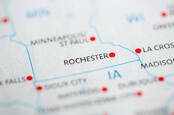This article is more than 1 year old
US govt confirms FCC's broadband speeds and feeds stats are garbage
GAO report on tribal land may open up rigged system
A report by the US Government Accountability Office (GAO) has confirmed what others have reported for years: that official data on internet access across the country greatly over estimates availability and competition.
The report [PDF] is focused specifically on tribal lands – small semi-autonomous areas of the United States governed by indigenous tribes – but its conclusions are directly applicable to the rest of the country.
The GAO's key finding is that broadband data gathered by the Federal Communications Commission (FCC) from reports compiled by internet services providers (ISPs) "do not accurately or completely capture broadband access."
The report mirrors numerous other complaints about so-called Form 477 data: most importantly that it over estimates the availability of internet access because, as the GAO notes, "FCC considers broadband to be 'available' for an entire census block if the provider could serve at least one location in the census block." [Its emphasis.]
In other words, even if an ISP does not serve anyone within a given census block (which typically covers between 30 and 500 people), it can claim 100 per cent availability if just one person can sign up to its service. The system also doesn't consider the speed or price of that service.
The large cable companies in America have become expert in analyzing their business at the census-block level so observers have little doubt that the flaws in the official data-gathering approach are used to restrict competition and inflate prices while painting an entirely different picture – one of healthy competition - to regulators.
That approach "leads to overstatements of service for specific locations like tribal lands", says the GAO, adding: "Because FCC uses these data to measure broadband access, it also overstates broadband access - the ability to obtain service - on tribal lands."
Fail
It also notes the FCC's failure to gather additional data that could mitigate the issue: "FCC does not collect information on several factors - such as affordability, quality, and denials of service - that FCC and tribal stakeholders stated can affect the extent to which Americans living on tribal lands can access broadband services."
And it flags that the faulty data can have a significant real-world impact: "Overstatements of access limit FCC’s and tribal stakeholders’ abilities to target broadband funding to such areas. For example, some tribal officials stated that inaccurate data have affected their ability to plan their own broadband networks and obtain funding to address broadband gaps on their lands."
It's worth noting that the FCC was recently blocked by a court from limiting subsidies through its long-standing Lifeline program; a program that is frequently used by residents of tribal lands.
The report also notes that the cable companies are not exactly helpful when it comes to providing information about the availability of their own services. Many of the people it spoke to complained that they could not get relevant information.
"A representative from one tribe stated that a provider declined his requests to meet more than once a year to discuss the provider's deployment of broadband services on the tribe's land," the report notes.
"A representative from another tribal government stated that some providers are very focused and transparent about their broadband plans and work with the tribe, while other providers treat tribal engagement as a 'box to check' and send the tribe broadband deployment information that is not useful because it is redacted."
And the FCC doesn't appear interested in doing what the GAO has done and talking to actual people on the ground, it noted. "FCC does not have a formal process to obtain tribal input on the accuracy of provider-submitted broadband data," the report red flags.
"About half of the tribal stakeholders GAO interviewed raised concerns that FCC relies solely on data from providers, and most stated FCC should work with tribes to improve the accuracy of FCC’s data."
It's fixable, but takes will
As a result the GAO issued three main recommendations of the FCC chair Ajit Pai:
- That he come up with new ways "for collecting and reporting accurate and complete data on broadband access specific to tribal lands."
- That he "develop a formal process to obtain tribal input on the accuracy of provider-submitted broadband data."
- That he "obtain feedback from tribal stakeholders and providers on the effectiveness" of an earlier FCC promise to make sure tribal lands were listened to when it comes to internet access.
Although the GAO report was specifically focused on tribal lands and has been careful not to step outside those boundaries, the report is sure to be used by others advocating for greater competition across the US as a whole.
A recent deep-dive into one US city - Rochester in Minnesota – revealed that while ISPs and local politicians claimed near-blanket broadband coverage with multiple providers, the reality was that less than one per cent of the people in the area had a choice of four or more ISPs. Nearly 20 per cent of residents had no wired option at all, and a further 36 per cent had the choice of a single provider.
A report back in July took a national look at the broadband market and concluded "the market has spoken: the market is broken." It found that it was impossible to tell what the real level of competition was but that the extraordinary percentage take-up of particular company's services was a strong indicator that real competition was an illusion.
Fail
Comcast, for example, manages to scoop up an extraordinary 60 per cent of all the people that could theoretically access its services – 65 million of a potential 110 million customers. That would an amazing achievement for any company but considering Comcast consistently ranks as one of the most disliked companies in America, it is clear that the official picture bears little relation to the reality on the ground.
Awareness of the problem has grown so large that even members of Congress have started complaining about the situation.
"The maps stink," Senator Jon Tester (D-MT) said to FCC chair Ajit Pai at a recent hearing, referring to the widely panned coverage maps produced by the FCC that are built from the flawed Form 477 data. "You've got to target those maps."
And while Pai acknowledged flaws in the process, his failure to put forward any changes when he is so conscientious about changes to other aspects of the FCC's functioning speaks volumes.
With this GAO report, Pai will now be forced to review how the FCC deals with that same data when it comes to tribal lands. And you can be sure that whatever changes are made, critics will then ask why they are not applied across the rest of the country.
In short, those advocating for real competition and fast internet access at a reasonable price in the United States have just been given a useful tool in the GAO report to force the federal regulator to do its job properly. ®


